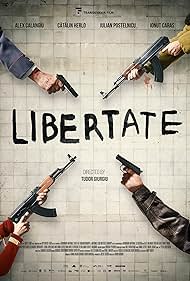I encourage people to watch this moviehowever much watching it infuriated me
During Romania's 1989 revolution, Sibiu witnesses a violent attack on a police station that spirals into armed clashes between soldiers, police, protesters and secret police.. References Rocky (1976). It is a compelling and, as previous posters (apparently mostly Romanian) have written, it is indeed an "immersive experience," and deserves to be viewed and applauded from an artistic standpoint.
But it is unfortunately a deeply regrettable travesty from the point of someone who has spent decades investigating the events of the Romanian Revolution of December 1989
My first, of several, hopefully, episodic, entries, is to demonstrate that despite what Tudor Giurgiu, the director, has said in his many interviews, and what one reviewer, Eugen Istodor, has said… "Vocea securistilor nu s-a azut 30 si ceva de ani si filmul le da cuvantul." (Hotnews.ro 7 October 2023)…"The voice of the Securitate (communist era secret police) has not been heard for 30 plus years and this film gives them the floor."…there is nothing new in this story…in fact, it has been expressed repeatedly and has long since achieved a hegemony in the Romanian media and everyday life. (Tudor Giurgiu has spoken in public at these showings, I was there for one, about the "fake narratives (about the Army) that have dominated for 30 plus years…and about the supposedly dominant narrative of "the Glorious Army" ;…but let us test his claims here)…below, for English speakers, two famous public discussions of the Sibiu December 1989 events…from 1990 and 1997, therefore for 33 years and 26 years respectively…to be continued…POET, ESSAYIST, AND NPR COMMENTATOR ANDREI CODRESCU in Sibiu in July 1990, seven months after the Romanian Revolution of December 1989 As my friends spoke, a strange feeling engulfed me.
Could my friends also have been?
Most of what they said sounded true, but there seemed to be something missing, one element of the plot that no one cared to mention. Here, in the middle of this sumptuous feast, I experienced the eeriness of another (hardly new) revelation: They were all blaming the army for the shootings; none of them blamed the Securitate. And yet the official government line was that the Securitate – not the army – massacred all those people who were undeniably massacred in Bucharest, Sibiu, and elsewhere.
Even his son, who’d been in charge at Sibiu, hadn’t ordered anybody to fire at demonstrators
I felt like drawing two fingers across my shoulder (a sign he had earlier related was used to communicate that someone had Securitate ties), but I had no one to do it for. In any case, the point they were making, and which was being corroborated everywhere these days, is that many shots had been fired, but few in defense of Ceausescu, He had been betrayed by everyone. Ironically, the People’s Army started shooting at the crowds at the same time that the army was officially coming over to "the side of the people." However, the shooting was intended to create more panic than corpses.
That was (only) the rumour" He paused for a moment
Romania's TV revolution had only one side …Everyone had been on it.–"Big Chills: My High School Reunion in Romania," HARPER’S MAGAZINE, NOVEMBER 1990 and Back in 1997, the American novelist and Pulitzer Prize Winner William McPherson wrote of what Valentin Ceausescu, communist dictator Nicolae Ceausescu’s eldest son, told him about the events of the Romanian Revolution of December 1989 Here are some excerpts: Valentin and I were having coffee in the Vox Maris, the same grand casino where the funeral feast was held. It was morning, two days after the funeral (of Nicu Ceausescu), and the crowds had not yet arrived.–"Nicu was never groomed to be the successor. "But rumors even become the reality."–"Yes.




 37/28
37/28